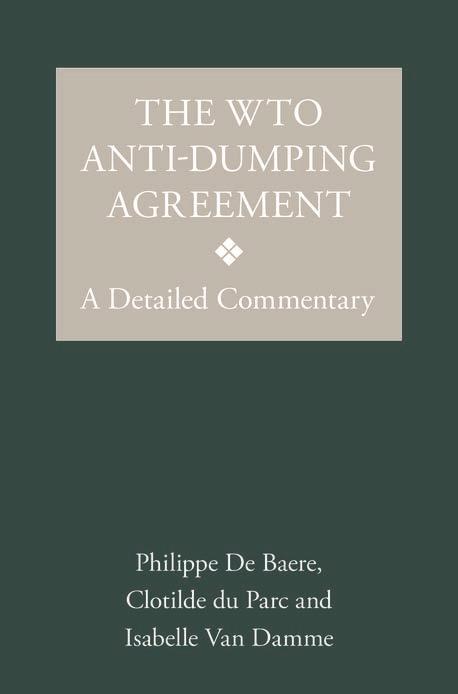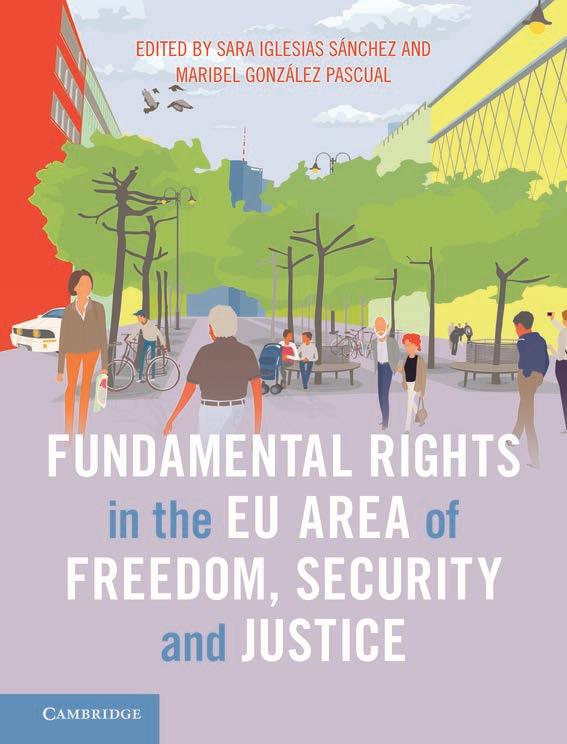
4 minute read
Entailment, Presupposition, Implicature; 18. Speech Acts, Actions, and Events
The WTO Anti-Dumping Agreement
A Detailed Commentary Philippe De Baere
Advertisement
Van Bael & Bellis
Clotilde du Parc
Van Bael & Bellis
Isabelle Van Damme
Van Bael & Bellis
Description
A unique article-by-article commentary on the WTO Anti-Dumping Agreement, offering an essential and comprehensive insight into WTO case-law. This commentary is an indispensable reference tool for government officials, practitioners and academics working on antidumping issues. The commentary’s structure allows the reader to identify immediately which disputes are relevant for the interpretation of each provision. It offers a clear analysis of the applicable rules and a comprehensive explanation of what, as a result of the WTO case-law, those rules mean. This commentary has been written by practitioners who have all been directly involved in a large number of WTO disputes and who have extensive experience in anti-dumping investigations and in challenging anti-dumping determinations before the WTO and before national courts.
Key Features
• A comprehensive and up-to-date commentary on the WTO Anti-Dumping Agreement, written by practitioners and scholars • Offers an easily accessible tool for understanding the operation and interpretation of the WTO Anti-Dumping Agreement • Takes into account the actual practice of anti-dumping investigations and offers valuable practical insights into how anti-dumping determinations can be successfully challenged before the WTO
Contents
Part I. Introduction; Part II. Article 1 –Principles; Part III. Article 2 –Determination of Dumping; Part IV. Article 3 –Determination of Injury; Part V. Article 4 –Definition of Domestic Industry; Part VI. Article 5- –Initiation and Subsequent Investigation; Part VII. Article 6 –Evidence; Part VIII. Article 7 –Provisional Measures; Part IX. Article 8 –Price Undertakings; Part X. Article 9 –Imposition and Collection of Anti-Dumping Duties; Part XI. Article 10 –Retroactivity; Part XII. Article 11 –Duration and Review of Anti-Dumping Duties and Price Undertakings; Part XIII. Article 12 –Public Notice and Explanation of Determinations; Part XIV. Article 13 –Judicial Review; Part XV. Article 14 –Anti-Dumping Action on Behalf of a Third Country; Part XVI. Article 15 –Developing Country Members; Part XVII. Article 16 –Committee on Anti-Dumping Practices; Part XVIII. Article 17 –Consultation and Dispute Settlement; Part XIX. Article 18 –Final Provisions.
Additional Information
Level: Academic researchers, legal practitioners
Sara Iglesias Sánchez
Court of Justice of the European Union
Maribel González Pascual
Universitat Pompeu Fabra, Barcelona
Description
The development of the Area of Freedom, Security and Justice has transformed the European Union and placed fundamental rights at the core of EU integration and its principles of mutual recognition and trust. The impact of the AFSJ in the development of an EU standard of fundamental rights, which has come to the fore since the Treaty of Lisbon, is a topic of great theoretical and practical importance. This is the first systematic academic study of the AFSJ and its implications from the point of view of fundamental rights. The contributions to this collection examine the normative and jurisprudential development of the AFSJ in order to assess its effects on the overall construction of the scope and standards of protection of EU fundamental rights in this particularly complex and sensitive field of integration. The expert contributors systematically map and critically assess this area of EU law, together with the relevant case-law.

Key Features
• Experts from different perspectives and fields examine fundamental rights in the European Union • Provides the reader with an up-to-date account of case-law in a particularly complex field • Includes critical assessment of the AFSJ from a fundamental rights perspective
Contents
Preface; Foreword; List of common abbreviations; Introduction: fundamental rights at the core of the EU AFSJ; Part I. The General Framework for Fundamental Rights’ Protection in the AFSJ: 1. The scope of EU fundamental rights in the area of freedom, security and justice; 2. A European standard of fundamental rights’ protection?; 3. The protection of fundamental rights within the AFSJ: through or against mutual trust and mutual recognition?; Part II. Asylum, Migration and Borders 4. Mutual (dis-) trust in EU migration and asylum law: the exceptionalisation of fundamental rights; 5. The right to liberty in the field of migration, asylum and borders; 6. Family life and the best interests of the child in the field of migration; 7. A decade of EU fundamental right to asylum: in search of its legal meaning and effects; 8. Effective remedies and defence rights in the field of asylum, migration and borders; Part III. Judicial Cooperation in Criminal Matters: 9. Mutual recognition in civil and commercial matters: on certified mutual trust; 10. The rights of the child and the right to respect for family life in the revised
Brussels iibis regulation; 11. Effective remedies and fair trial in civil matters: How to enhance civil justice within the confines of EU powers; 12. Procedural rights (and obligations) of parties to civil proceedings; Part IV. Judicial Cooperation in Criminal Matters and Police Cooperation: 13. Mutual recognition and fundamental rights in EU criminal law; 14. The right to liberty and security in EU criminal law; 15. Defence rights and effective remedies in EU criminal law; 16. Victims of crime in the area of liberty, security and justice; 17. The principle of legality within the area of freedom, security and justice; 18. The interpretation and application of the Ne Bis Iin Idem principle in the EU area of freedom, security and justice of the EU; Part V. Cross-cutting Issues of Fundamental Rights in the AFSJ: 19. Private life and data protection within the area of freedom, security and justice; 20. Citizenship and non-discrimination rights in the area of freedom, security and justice; 21. Vulnerability and fundamental rights in the area of freedom, security and justice; 22. Epilogue: of judges and trust.
Additional Information
Level: Academic researchers, professionals










